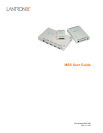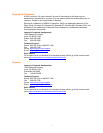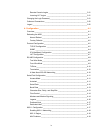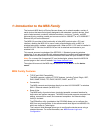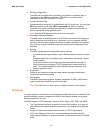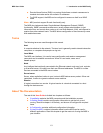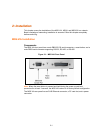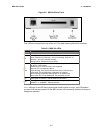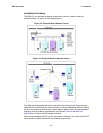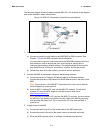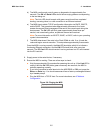
1-1
The Lantronix MSS family of Device Servers allows you to network-enable a variety of
serial devices that were not originally designed to be networked: medical devices, retail
point of sale terminals, modems, industrial machinery, and more. Typically, an MSS
achieves this by providing a serial port on one end and a 10BASE-T or a 10/100BASE-T
Ethernet I/O port on the other end.
The MSS-VIA provides all the functionality of other MSS products plus a PC card
interface, allowing the MSS-VIA to use a variety of technologies such as 802.11b
wireless technology, modems, and storage cards. When an 802.11 PC card is installed in
the MSS-VIA PC card slot, the MSS-VIA can link its attached serial device to your
wireless LAN.
This manual assumes knowledge of the IEEE 802.11 Standard governing wireless
networking. If you are not familiar with wireless networking concepts and implementation,
please refer to the Standard or the documentation that came with your wireless PC card.
Note: For a current list of supported PC card technologies, please check the MSS-VIA
product page on the Lantronix website: http://www.lantronix.com/.
Throughout this manual, the MSS may be referred to as the MSS or as the device
server.
MSS Family Features
TCP/IP and UNIX Compatibility
The MSS supports a variety of TCP/IP features, including Telnet, Rlogin, UDP,
DNS, SNMP, WINS, FTP, DHCP, BOOTP, RARP, and HTTP.
Connectivity
The MSS connects serial devices directly to a wired 10/100 BASE-T or wireless
802.11 Ethernet network (for MSS-VIA).
Ease of Use
The MSS family of products has a simple but powerful command interface for
both users and system managers. The MSS Local mode supports command line
editing, command line recall, and command completion. An extensive Help
facility is included.
The EZWebCon utility (provided on the CD-ROM) allows you to configure the
MSS from any host machine. It also allows remote host logins into the MSS-VIA,
which are similar to Telnet logins.
The Lantronix Web Manager allows you to configure the device server using a
standard browser. For more information, see Web Browser Login and
Configuration.
1
1
:
:
I
I
n
n
t
t
r
r
o
o
d
d
u
u
c
c
t
t
i
i
o
o
n
n
t
t
o
o
t
t
h
h
e
e
M
M
S
S
S
S
F
F
a
a
m
m
i
i
l
l
y
y



